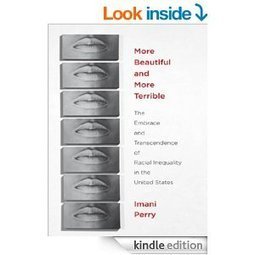
“For a nation that often optimistically claims to be post-racial, we are still mired in the practices of racial inequality that plays out in law, policy, and in our local communities.
One of two explanations is often given for this persistent phenomenon: On the one hand, we might be hypocritical saying one thing, and doing or believing another; on the other, it might have little to do with us individually but rather be inherent to the structure of American society.
More Beautiful and More Terrible compels us to think beyond this insufficient dichotomy in order to see how racial inequality is perpetuated. Imani Perry asserts that the U.S. is in a new and distinct phase of racism that is post-intentional neither based on the intentional discrimination of the past, nor drawing upon biological concepts of race.
Drawing upon the insights and tools of critical race theory social policy, law, sociology and cultural studies, she demonstrates how post intentional racism works and maintains that it cannot be addressed solely through the kinds of structural solutions of the Left or the values arguments of the Right. Rather, the author identifies a place in the middle space of righteous hope and articulates a notion of ethics and human agency that will allow us to expand and amplify that hope.
To paraphrase James Baldwin, when talking about race, it is both more terrible than most think, but also more beautiful than most can imagine, with limitless and open-ended possibility. Perry leads readers down the path of imagining the possible and points to the way forward.”
Community Village‘s insight:
Tim Wise worked with this author (Professor Imani Perry Ph.D.,J.D.) in his movie ‘White Like Me‘
‘More Beautiful and More Terrible’ has 5 out of 5 stars and glowing reviews.
I’m looking forward to this breakdown of “post-intentional’ racism.
It seems like the idea goes in conjunction with Michelle Alexander’s book ‘The New Jim Crow’. Where Alexander explains that even though the laws behind the war on drugs do not mention race, the effects are that with limited budgets and resources (and subconscious racism?), police forces primarily focus their war on Black and Brown communities, even through white people use illegal drugs as much or more than Black and Brown communities.
And because you can’t have a war on an inanimate object, the war is waged on Black and Brown people and on Black and Brown communities.
@getgln
See on www.amazon.com



